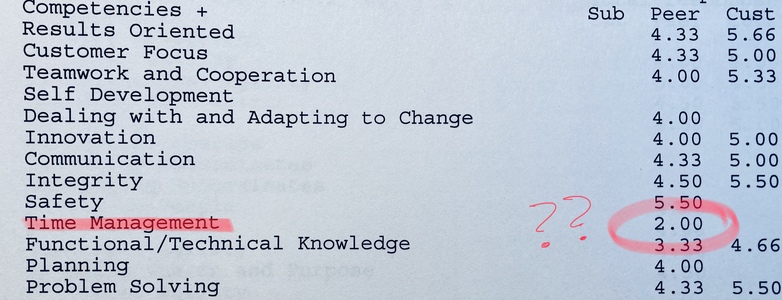What would you do if your peers scored you as 2 out of 6? I’ll tell you what I did!
See the 2 jump off the page
I walked into my office, shut the door, sat in my desk chair, and stared at the peer review report I was holding in my hand. Everyone on our team had filled them out over the prior week, and we were each having a one on one with our supervisor that day to look at the data. And here it was. A list of a twenty six competencies, each with a 1 to 6 rating. 1 being “considerable improvement needed” and 6 being “outstanding”.
There was one glaring outlier on my sheet of paper.
A score of 2 out of 6.
For time management?

Emotions: confusion -> anger -> frustration
When I first saw it, I was confused. Based on how I had rated my peers in this category, I should be doing fine. Did I not understand the category? I wasn’t missing meetings or impacting how they were scheduled, and I wasn’t missing deadlines.
As I discussed it with my supervisor (who rated me a 5), all I grasped was that I was perceived as arriving to the office later than everyone else. Confusion became anger at being judged in this way.
I stayed later than everyone else. I had a predictable morning routine that involved going to a gym on the way to work and arriving at the office by 9am with energy and focus. My day wasn’t structured by beating rush hour traffic – I walked to work! And I didn’t have to get home for after-school pick-up – I didn’t have kids!
Anger shifted to frustration at the idea of sacrificing either my morning routine or some “punctuality” score.
The real kicker was that I had actually talked with my supervisor when I transferred onto the team, to check that my preferred working hours would be okay. Didn’t my peers know that? Did they think I could be so irresponsible??
Oh!! this is about a different competency
Hearing this exasperated, rhetorical question in my head, I paused with the weight of the answer that came next. Ohhh! No. No, my peers did not know any background on my morning routine! I was starting to see how they could perceived me as willfully disregarding the general group norm.
The 2 out of 6 wasn’t actually about time management.
The 2 was about connection.
It was a blunt reminder that my value on the team wasn’t just about doing my work well, or putting in quality hours. It was also about connecting with my peers, sharing more about how I prioritize and manage my time, and creating open channels for talking to each other when something doesn’t quite feel right. Indeed, I had room for improvement!
Exercise for your connection muscle
So here’s an exercise to help you strengthen your connection muscle:
- Today, pick an element of your normal routine.
- Maybe it’s what time you like to start work, or have a break for lunch, or maybe it’s how you most like to get messages, or schedule meetings
- Then, list how others might have a different preference.
- I know my construction colleagues think lunch is no later than 11am, and some of my executive colleagues don’t think about lunch until at least 1pm
- And it seems just as many coworkers encourage texting as those who don’t
- Through this week, find at least one opportunity to share your preference with a colleague and some context for why.
- This isn’t about defending your choice. It’s about bringing some transparency to your relationship.
- At the end of the week, notice if you’ve become more aware of the preferences of those around you, and notice how having this additional context affects your connection.


